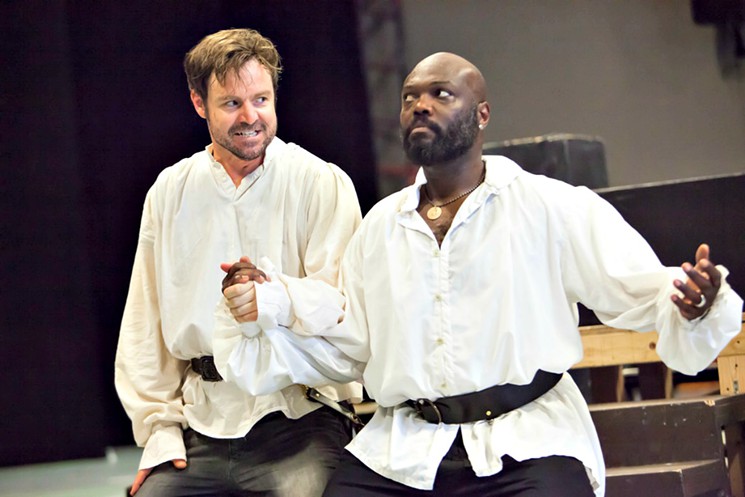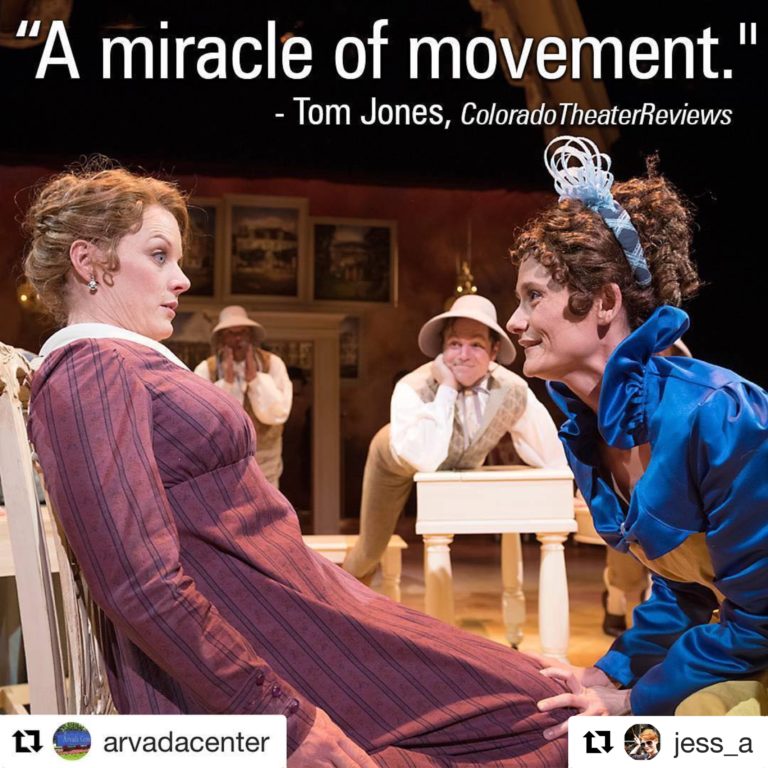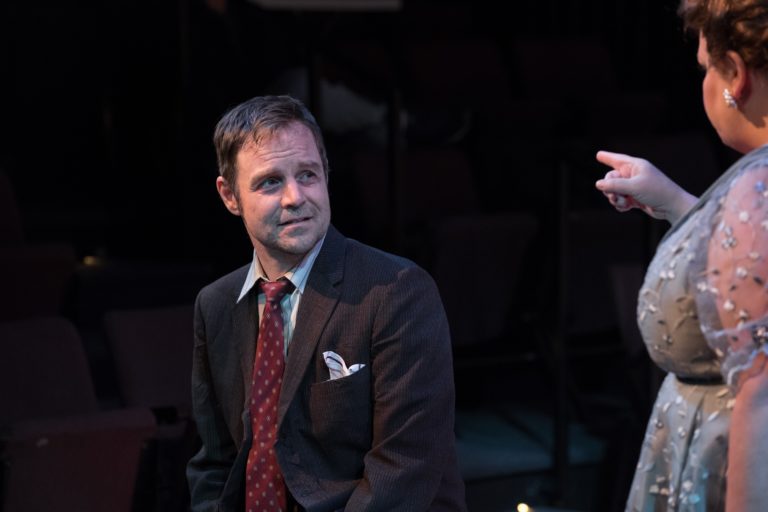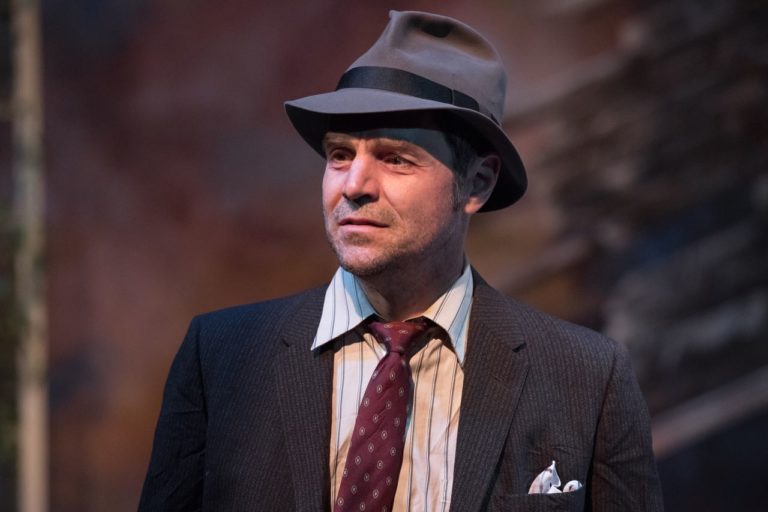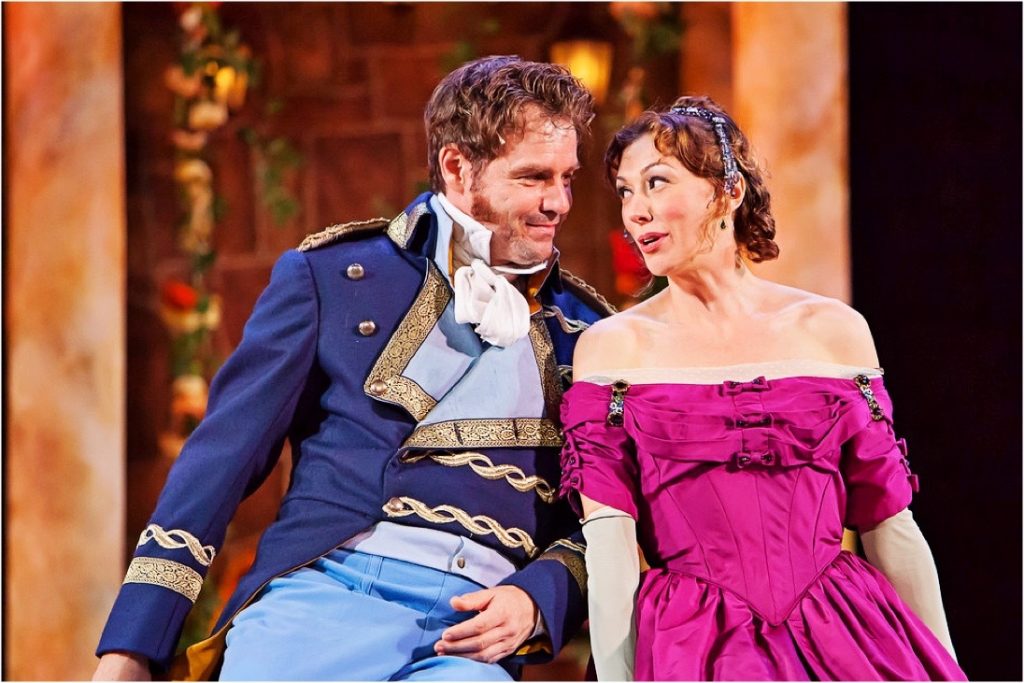
Geoffrey Kent on Swordfights, Playing Iago and the Colorado Shakespeare Season
BY BRAD WEISMANN, WESTWORD
Geoffrey Kent is a busy guy. He’s playing Don Pedro in this summer’s Colorado Shakespeare Festival production of Much Ado About Nothing, and he’s doing a couple of roles in Henry V. And Talbot in Henry VI, Part One. He’s also the fight director for all these shows, making sure feats of swordplay aren’t marred by actual stabbings. And starting Friday, he’ll be portraying Iago in Othello. The pace of summer repertory theater is blistering, one of the best workouts a theater person can get.
Kent is the quintessential local boy made good. Growing up near Alameda and Broadway, he later moved with his mom to Longmont, and then attended University of Northern Colorado. Soon he was out in the acting world, where an interest in learning stage-combat technique led to his mastery of everything from faked fisticuffs to swordplay to the handling of stage firearms. A past president of the Society of American Fight Directors, Kent’s special skills put him in demand for work with theaters that focus on such things as Shakespeare, swashbucklers and Martin McDonagh plays (works by the graphically violent contemporary Irish playwright have been a huge boon to the stage combat world).
Kent’s combat work naturally led him to more and more Shakespearean roles, until now he’s as well-known as a stalwart interpreter of the Bard as he is as a master at choreographing stage violence. He’s moving in new directions as well – his recent direction of Qui Nguyen’s She Kills Monsters at the Aurora Fox was well-regarded. He recently talked with us about the role of Iago, the allure of live theater and the close-knit Colorado scene.
Westword: Is it better for you to have a short rehearsal schedule? Does it prevent you from overthinking things?
Geoffrey Kent: It’s a fast and frenetic process, it really makes you put your head into it! I tend to celebrate the victory of the short rehearsal process. I like it because, like you said, it doesn’t give you time to question a lot of choices. You really have to go big or go home. Since the Shakespeare Festival has such a short run-up to the shows, an interesting aspect of working here is how the roles evolve through performances. They open strong, but they do tend to grow over the course of the run. Having a limited number of performances means that you absolutely go for it each time – still, hopefully, the same people die at the same time each show.
Is this your first Iago? How hard is it to play such an archetypical bad guy?
Well, he has the third-most lines of any Shakespeare character, and he talks to the audience a lot – but I don’t think they want him to talk to them. Iago is charming, and terrible. The role is front-loaded, and I do most of the talking. But the play is Othello’s. Iago in a way is just the narrator, the chorus as well as the antagonist. My job, if I do it, is to tell the story of Othello. If I’m too smarmy, I make Othello look like an idiot. Fortunately, we have a kick-ass Othello. He has a huge voice and presence, and I find myself leaning on him a little bit, which serves the play, it makes it more of a real relationship – these men were best friends, but Othello doesn’t know they aren’t anymore. It’s great to watch Peter Macon (Othello), so deeply conflicted and wrestling with doubt. I push, and push, and then overpush and put myself in danger – it’s going to be fun to watch, as fun as playing Mercutio a few years ago in Romeo and Juliet.
You have done a lot of contemporary works as well – what is unique about doing classical theater, especially Shakespeare?
Being able to play Shakespeare is like being able to do musical comedy – you use a certain set of acting muscles. The key is to be able to penetrate the language to make it accessible. And when you do a lot of Shakespeare, you are simply able to unpack it that much quicker, you’re over that hurdle and you can act it faster. This is my third Much Ado at CSF, so I’m comfortable and I can make big choices early.
Did your expertise in stage fighting come from personal interest, or was it part of a career plan?
I developed it as a career without knowing it. There was something about the physicality that was playable to me, the physical engagement was very pleasurable, and what we call “flinging steel” is an actable thing. Out of college, I was not getting cast in a lot of things, so stage combat started as a kind of hobby for me. Then I went from workshops for kids, to adults, to teaching at the National Theatre Conservatory, staging at the Denver Center . . . and I started acting again, initially as a “ringer” – someone with a very specific set of skills, like someone who can do a tap solo or hit a high note. Shakespeare pays my mortgage. And now, sometimes, when I act? I don’t have to stab anybody!
I’m sure it helps that Denver is such a good theater town.
I’ve been acting in and around Denver for 23 years, and it’s great! It’s a big theater family. I actually like it. And I love it. I feel safe to make big choices.
How to you deal with all the multi-tasking?
I think it’s the ADD kid in me; I can always turn to something I love to do. You know, it’s possible at CSF to be involved with putting on four separate shows in one day. The audience likes to play Actor Bingo on the “Who’s Who” page of the program! Sometimes we do have to stop and go, “Wait, which one is this again?”

